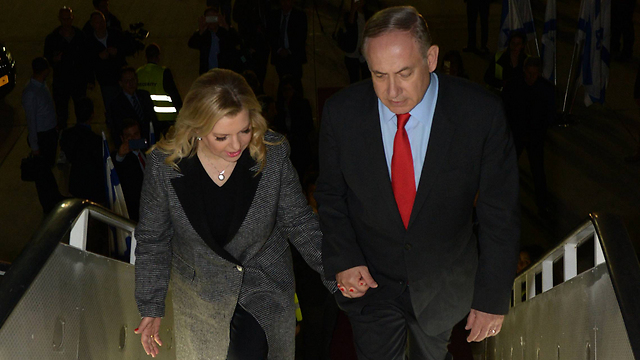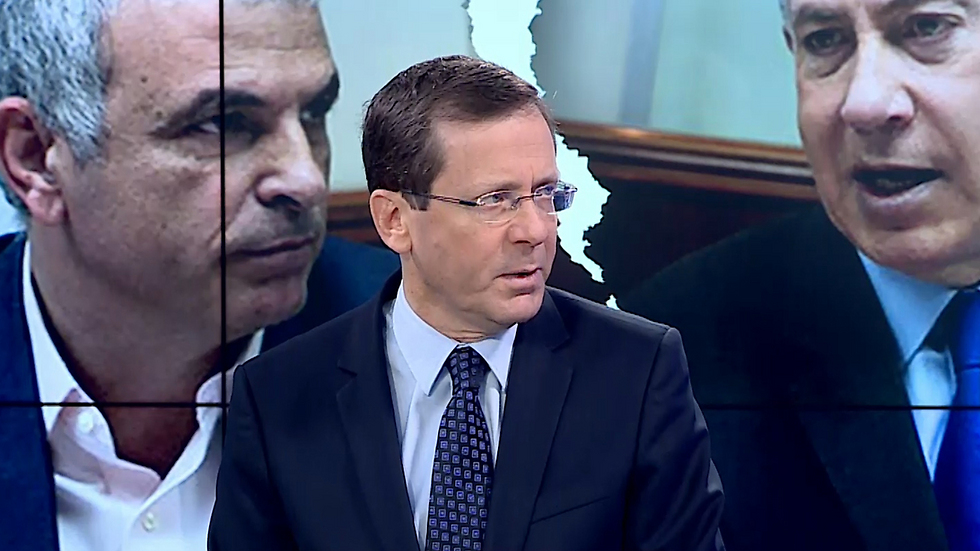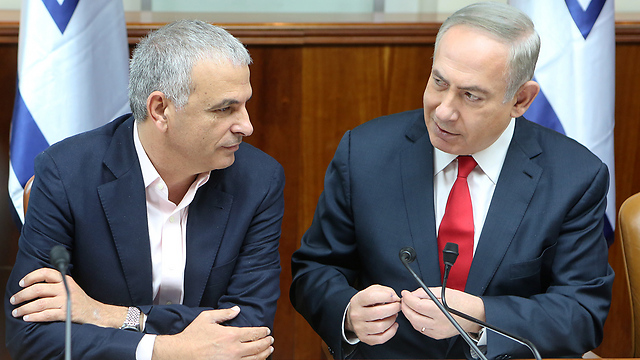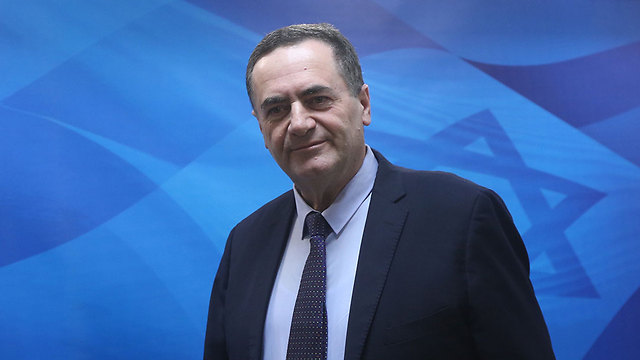
Herzog calls on Kahlon to resign, form alternative government with him
The opposition leader calls for a constructive vote of no confidence that would oust the government without forcing early elections; he says willing to examine any suitable candidate to replace Netanyahu, including Kahlon and Lapid.
On Saturday night, Prime Minister Benjamin Netanyahu threatened to go to early elections amid his ongoing feud with Kahlon over the new Israel Public Broadcasting Corporation (IPBC).
The threat, which came after Netanyahu changed his mind about the IPBC and argued it should be shut down before it even starts broadcasting, led to a firestorm in the political system.
"We can change governments in this current Knesset," Herzog told Ynet. "Over 61 MKs would love to see Netanyahu go home."
"People have been talking behind the scenes for a long time," the opposition leader claimed. "The political system has had enough of Netanyahu's behavior a lot time ago. It's insufferable."
Herzog said he spoke to Kahlon on the matter more than once over the past 24 hours. "We've agreed to examine all sorts of options, including a constructive vote of no confidence, which means an alternative government (without going to elections)," he said. "We can create a coalition in various different ways."
The opposition leader claimed he was willing to examine any candidate to replace Netanyahu as prime minister. "Kahlon can clearly be an alternative candidate, but there are others. I'll also talk to (Yair) Lapid and others."
"People need to put away their ego," he argued. "I've proven that I know how to break egos to try and lead the country in a different direction. That's my advantage, I believe in an alternative, sane Zionist bloc that could lead the country instead of Netanyahu."
Herzog accused the prime minister of "spending days thinking what to do with the IPBC while the situation in the north and the south escalates. Netanyahu doesn't care about the Israel Broadcasting Authority (IBA) employees, it's all coming from a different place: From the investigations against him and to pressure from (US President) Trump."
Netanyahu, Herzog claim, "has a sick obsession with the media."
Transportation Minister Yisrael Katz (Likud), meanwhile, tried to douse the flames, saying there is no support in the ruling Likud party for Netanyahu's move to go to early elections.
"There is no reason to hold early elections," Katz claimed in an interview with Ynet. "There are no disagreements within the coalition over fundamental issues. You don't go to early elections over a dispute regarding the media. This sort of thing necessitates a solution, not creating a climate that would lead to elections."
Katz said there were no consultations among the party leadership on the matter, nor were any decisions made to that end. "If such a discussion is held, I'll make my position heard and I'm convinced I won't be the only one of that opinion."
He argued that government stability and continuity was vital in light of the regional developments in Syria and Lebanon and the internal challenges Israel faces.
But while Katz tried to downplay the discord in the coalition, Tourism Minister Yariv Levin (Likud), who also serves as liaison between the Knesset and the government, characterized the argument between Netanyahu and Kahlon over the IPBC as a "real crisis."
On Saturday, the prime minister held a meeting with Likud Ministers Levin, Miri Regev and Tzachi Hanegbi and Coalition Chairman David Bitan. The general consensus of the meeting was that the IPBC should not be allowed to start broadcasting, and that the feud between Netanyahu and Kahlon cannot be allowed to continue.
"If we can't reach an agreement with Kahlon—we'll go to elections," Netanyahu warned during the meeting.
Kahlon himself has yet to officially respond, but sources close to him said that "If Netanyahu wants elections—Kahlon is not worried. The IPBC will be erected just as it was agreed on."
Before leaving for a state visit to China, Netanyahu took to Facebook to address the ongoing crisis. "Governments exist based on coalition agreements," he wrote. "The coalition agreement clearly states that all parties are bound by the Likud's decisions on communications, including closing down the IPBC. It cannot be that the Likud party—with 30 seats at the Knesset—honor all of the coalition agreements of smaller parties, even on topics we disagree on... while we it comes to our agreements—that are important to the Likud and to me—they're not being honored. This is unacceptable."

During the meeting with the Likud ministers, they presented Netanyahu with the data concerning the IBA's restructure, claiming that it won't require any further spending, and is therefore out of the Kahlon's jurisdiction, since the finance minister cannot interfere in any law concerning communications which doesn’t require funding.
"I changed my opinion following a meeting I held with IBA workers yesterday," Netanyahu wrote on Facebook. "In the meeting I listened to heart-wrenching stories about experiences and dedicated workers sent home because of the IPBC.
"In addition to that, it was revealed during the meeting that, contrary to data by the Finance Ministry, the cost of keeping the IBA running is tens of millions of shekels cheaper than erecting the IPBC. So what do we even need it for?"
Culture Minister Miri Regev raised a similar argument in Ynet's studio on Sunday morning, saying "When there's no implementation of coalition agreements, we can't go on. Today it's about the IPBC, tomorrow it would be about Amona, and the next day it would be about something else. A government can only function and govern when coalition agreements are honored."
She further argued that "we'll go to elections over principle. Those who say we want to go to elections because of the IPBC fail to see the bigger picture."
MK Yoav Kisch (Likud) noted that while "no one has the desire to go to elections, the matter is in Kahlon's hands. He needs to understand he deviated from coalition agreements. The Treasury needs to understand it is not the one running the country."
Defense Minister Avigdor Lieberman, whose party joined the coalition over a year after it was formed, said Sunday that "Elections is the last thing the people of Israel need at this time. I hope a compromise is found; there is no reason to dismantle the current coalition."
(Translated and edited by Yaara Shalom)













